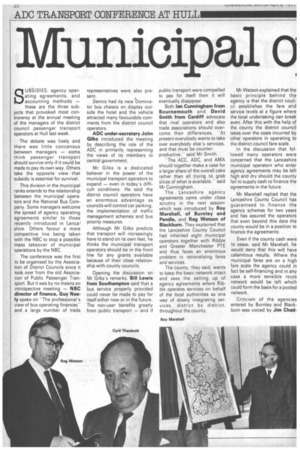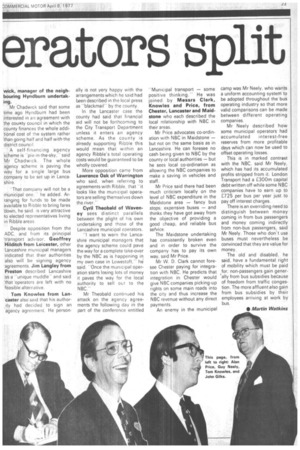Municipal a orators split
Page 24

Page 25

If you've noticed an error in this article please click here to report it so we can fix it.
SUBSIDIES, agency operating agreements. and .accounting methods — these are the three subjects that provoked most controversy at the annual meeting of the managers of the district council passenger transport operators at Hull last week.
The debate was lively and there was little concensus between managers — some think passenger transport should survive only if it could be made to pay its own way. Others take the opposite view . that subsidy is essential for survival.
This division in the municipal ranks extends to the relationship between the municipal operators and the National Bus Company. Some managers welcome the spread of agency operating agreements similar to those recently introduced in Lanca: shire. Others favour a more competitive line being taken with the NBC to stop a possible mass takeover of municipal operations by the NBC.
The conference was the first to be organised by the Association of District Councils since it took over from the old Association of Public Passenger Transport. But it was by no means an introspective meeting — NBC director of finance, Guy Neely spoke on "The professional's view of bus operating finances"' and a large number of trade representatives were also present. Dennis had its new 'Dominator bus chassis on display outside the hotel and the vehicle attracted many favourable comments from the district council operators.
ADC under-secretary John Gilks introduced the meeting by describing the role of the ADC in primarily representing the views of its members to central government.
Mr Gilks is a dedicated believer in the power of the municipal transport operators to expand — even in today's difficult conditions. He said the district council operators have an enormous advantage as councils will control car parking, the implementation of traffic management schemes and bus priority measures.
Although Mr Gilks predicts that transport will increasingly have to stand on its own feet, he thinks the municipal transport operators should be in the front line for any grants available because of their close relationship with county councils.
Opening the discussion on Mr Gilks"s remarks, Bill Lewis from Southampton said that a bus service properly provided could never be made to pay for itself either now or in the future. The non-user benefits greatly from public transport — and if public transport were compelled to pay for itself then it will eventually disappear.
Both Ian Cunningham from Bournemouth and David Smith from Cardiff advocate that rival operators and also trade associations should overcome their differences. "At present everybody wants to take over everybody else's services, and that must be counter productive,'" said Mr Smith.
"The ACC, ADC, and AMA should together make a case for a larger share of the overall cake rather than all trying to grab slices of what is available,'" said Mr Cunningham.
The Lancashire agency agreements came under close scrutiny in the next session which was introduced by Roy Marshall, of Burnley and Pendle, and Reg Watson of Blackburn. They explained that the Lancashire County Council had inherited eight municipal operators together with Ribble and Greater Manchester PTE and thus faces an enormous problem in rationalising fares and services.
The county, they said, wants to keep the basic network intact and sees the setting up of agency agreements where Ribble operates services on behalf of the local authorities as one way of slowly integrating services, district by district, throughout the county. Mr Watson explained that the basic principle behind the agency is that the district council establishes the fare and service levels at a figure where the local undertaking can break even. After this with the help of the county the district council takes over the costs incurred by other operators in operating to the district council fare scale.
In the discussion that followed many operators were concerned that the Lancashire municipal operators who enter agency agreements may be left high and dry should the county fail to supply cash to finance the agreements in the future.
Mr Marshall replied that the Lancashire County Council has guaranteed to finance the agency schemes for two years and has assured the operators that even beyond this date the county would be in a position to finance the agreements.
Even if the county cash were to cease, said Mr Marshall, he would deny that this will have calamitous results. Where the municipal fares are on a high fare scale the agency could in fact be self-financing and in any case a more sensible route network would be left which could form the basis for a pooled network.
Criticism of the agencies entered by Burnley and Blackburn was voiced by Jim Chad wick, manager of the neighbouring Hyndbum undertaking.
Mr Chadwick said that some time ago Hyndburn had been interested in an agreement with the county council in which the county finances the whole additional cost of the system rather than going half and half with district council .
A self-financing 'agency scheme is "pie-in-the-sky,said Mr Chadwick. The whole agency scheme is paving the way for a single large bus company to be set up in Lancashire.
"That company will not be a Municipal one," he added. Arranging for funds to be made available to Ribble to bring fares don, he said. is very attractive to elected representatives living in Ribble areas.
Despite opposition from the ADC, and from its principal transport advisor, Geoffrey Hi!ditch from Leicester, other Lancashire municipal managers indicated that their authorities also will be signing i agency -agreements. Jim Langley from Preston described Lancashire as a "unique muddleand said that 'operators are left with no feasible alternative, Tom Knowles from Lancaster also said that his author.ity had decided to sign an agency agreement. He person ally is not very happy with the arrangements which he said had been described in the local press as "blackmailby the county.
In the Lancaster case the county had said that financial aid will not be forthcoming to the City Transport Department unless it enters an agency scheme. As the county is already supporting Ribble this would mean that within an agency Ribble's total operating costs would be guaranteed to be wholly covered.
More opposition came from Lawrence Oak of Warrington who said, when referring to agreements with Ribble, that "it looks like the municipal operators are selling themselves down the river."
Cyril Theobald of Waveney sees distinct parallels between the plight of his own undertaking and those of the Lancashire municipal operators.
"I want to warn the Lancashire municipal managers that the agency scheme could pave the way for a complete take-over by the NBC as is happening in my own case in Lowestoft"' he -said. -Once the municipal operation starts losing lots of money it paves the way for the local authority to sell out to the NBC."
Mr Theobald continued his attack on the agency agreements the following day in the part of the conference entitled "Municipal transport — some positive thinking." He was joined by Messrs Clark, Knowles and Price, from Chester, Lancaster and Maidstone who each described the local relationship with NBC in their areas.
Mr Price advocates co-ordination with NBC in Maidstone — but not on the same basis as in Lancashire. He can foresee no cash being given to NBC by the county or local authorities — but he sees local co-ordination as allowing the NBC companies to make a saving in vehicles and staff.
Mr Price said there had been much criticism locally on the level of NBC expenditure in the Maidstone area — fancy bus stops: expensive buses — and thinks they have got away from the objective of providing a good cheap, and reliable bus service.
The Maidstone undertaking has consistently broken even and in order to survive the company has to pay its own way, said Mr Price.
Mr \At D. Clark cannot foresee Chester paying for integration with NBC. He predicts that integration in Chester would give NBC companies picking-up rights on some main roads into the city and thus increase the NBC revenue without any direct payments.
An enemy in the municipal camp was Mr Neely, who wants a uniform accounting system to be adopted throughout the bus operating industry so that more valid comparisons can be made between different operating companies.
Mr Neely described .how some municipal operators had accumulated interest-free reserves from more profitable days which can now be used to offset operating losses.
This is in marked contrast with the NBC, said Mr Neely, which has had its accumulated profits istripped from it. London Transport had a £300m capital debt written off while some NBC companies have to earn up to 2725 per bus per year just to pay off interest charges.
There is an overriding need to distinguish between money coming in from bus passengers and money coming indirectly from non-bus passengers, said Mr Neely. Those who don't use buses must nevertheless be convinced that they are value for money.
The old and disabled, he said, have a fundamental right of mobility which must be paid for: non-passengers gain generally from bus subsidies because of freedom from traffic congestion. The more affluentalso gain from bus subsidies by their employees arriving at work by bus.
• Martin Watkins




























































































